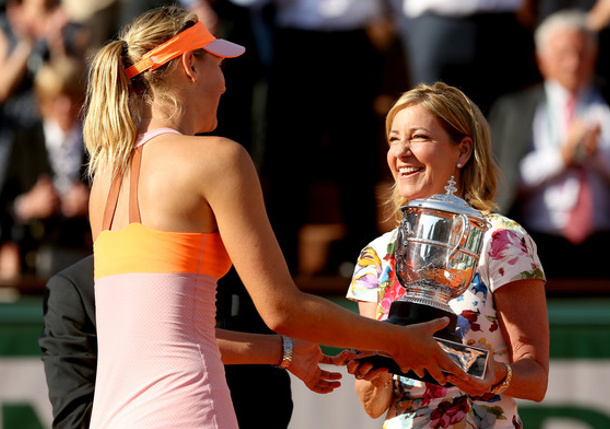
As the shock news of Maria Sharapova’s two-year drug ban hung over the tennis world like a black cloud, many are asking a difficult question: Will Sharapova ever play tennis again?
Read More from Evert and Davenport on Sharapova Here
Based on early opinions from former Hall of Famers, If Sharapova’s planned appeal does not get her a reduced sentence, she may not.
“I don’t think she can do a two-year ban. I don’t think she can come back,” Chris Evert told Nick McCarvel of USA Today on Wednesday after the news broke. “The players are only getting better. The workload, the training is only harder. She has been on tour for 15 years. You just wonder.”
Evert added: “I would be surprised to see her come back.”
Three-time Grand Slam champion Lindsay Davenport also has trouble seeing Sharapova returning after a two-year ban. “If the two years stands, I don't think she will come back,” Davenport told USA Today.
There is a lot riding on Sharapova’s appeal with the Court of Arbitration for Sport (CAS). The Russian was handed the maximum ban for unintentionally committing a doping violation, but hopes to appeal to the Court that she was not warned sufficiently enough by the anti-doping agency about the status of the drug meldonium, which was moved to the prohibited list this year.
“While the tribunal concluded correctly that I did not intentionally violate the anti-doping rules, I cannot accept an unfairly harsh two-year suspension,” wrote Sharapova in a statement.
Recent cases have been reduced at the CAS. Viktor Troicki has his 18-month ban reduced to 12 months, while Marin Cilic had his nine-month ban reduced to four months.
But there are big differences between those two cases and Sharapova’s. Troicki never tested positive for a banned substance. He instead failed to take a blood test that occurred after a miscommunication with anti-doping personnel. Cilic took a banned stimulant, but it was deemed that he took it inadvertently, and only once.
Sharapova has admitted that she took meldonium before each of her matches at the Australian Open. Despite the fact that she did not know that the substance had been banned prior to the beginning of this season, she failed to document her usage of the substance on her doping control forms.
The ITF will argue that Sharapova’s concealment of her regular use of meldonium and her failure to check and adhere to changes in the banned substance list make her culpable.
Leniency is not a guarantee in Sharapova’s unique case. There is a good chance that she will not be eligible to play until January 25th, 2018. Her fans will wait that long, but will Sharapova?